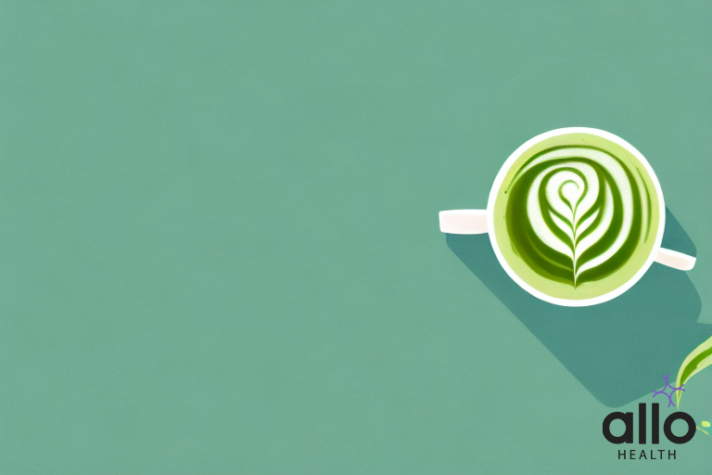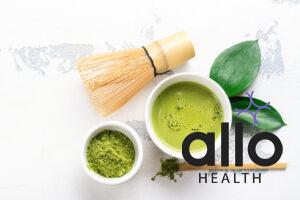Does Matcha Cause Infertility?

Allo Health is dedicated to personalized well-being, offering support and trusted information tailored to individual health goals. The platform emphasizes human-generated content, led by a distinguished medical team of experts, including physicians and sexual health specialists. Their commitment to credibility involves rigorous fact-checking, authoritative research, and continuous updates to ensure accurate, up-to-date information. Allo Health's unique approach goes beyond conventional platforms, providing expert-led insights and a continuous commitment to excellence, with user feedback playing a crucial role in shaping the platform's authoritative voice.

Dr Sanina Mansoor holds MBBS degree from Yenepoya university,Mangalore.She has 8 years of experience working as a medical officer at various health centres and medical colleges.
Why This Was Upated?
Our experts continually monitor the health and wellness space, and we update our articles when new information became available.
Updated on 02 February, 2024
- Article was updated as part of our commitment to diversity, equity, and inclusion.

"The following blog article provides general information and insights on various topics. However, it is important to note that the information presented is not intended as professional advice in any specific field or area. The content of this blog is for general educational and informational purposes only.
Book consultation
The content should not be interpreted as endorsement, recommendation, or guarantee of any product, service, or information mentioned. Readers are solely responsible for the decisions and actions they take based on the information provided in this blog. It is essential to exercise individual judgment, critical thinking, and personal responsibility when applying or implementing any information or suggestions discussed in the blog."
Matcha, a vibrant and trendy powdered green tea, has become increasingly popular in recent years due to its potential health benefits. However, like many popular food and beverage trends, it has also faced unwarranted skepticism and misinformation.
One question that has constantly raised concerns is- Does matcha cause infertility? In this article, we will explore the scientific evidence and separate fact from fiction regarding the alleged link between matcha and infertility.
What is Matcha?

Matcha is a traditional Japanese green tea that has gained popularity worldwide for its unique preparation and potential health benefits. It is made from shade-grown tea leaves that are finely ground into a bright green powder. The history of matcha dates back to over a thousand years, and it has been an integral part of Japanese tea ceremonies and Buddhist practices.
The process of growing and producing matcha involves several distinctive steps:
Shade Growing: The tea plants, usually Camellia sinensis var. sinensis or Camellia sinensis var. assamica, are carefully shaded from direct sunlight for several weeks before harvest. This process increases the production of chlorophyll and amino acids, particularly L-theanine, in the tea leaves, resulting in its vibrant green color and unique flavor profile.
Handpicking: The leaves are handpicked to ensure only the youngest and finest leaves are selected for the highest quality matcha.
Steaming and Drying: After picking, the leaves are steamed to prevent oxidation and preserve their green color. Then, they are dried to reduce moisture content.
Destemming and deveining: The stems and veins are removed from the leaves to enhance the smoothness and texture of the final product.
Stone Grinding: The dried and deveined leaves are ground into a fine powder using traditional granite stone mills. This slow grinding process prevents the tea from overheating and helps retain its vibrant green color and nutritional properties.
Unlike traditional green tea, where the leaves are steeped and removed, matcha is consumed whole. To prepare matcha, a small amount of the powdered tea is whisked with hot water using a bamboo whisk called a “Chasen,” creating a frothy and smooth beverage.
Key Characteristics of Matcha
Matcha, the vibrant green powdered tea, has several key characteristics that set it apart from other teas. These characteristics contribute to its unique flavor, appearance, and potential health benefits. Let’s explore the key characteristics of matcha:
Vibrant Green Color: One of the most striking features of matcha is its bright green color. This intense green hue is a result of the shade-grown cultivation process. By shading the tea plants from direct sunlight for several weeks before harvest, the leaves produce higher levels of chlorophyll, giving matcha its characteristic green color.
Fine Powder Texture: Matcha is ground into a very fine powder, which sets it apart from traditional steeped teas. The grinding process involves using traditional granite stone mills, ensuring that the tea leaves are transformed into a smooth and velvety powder.
Umami Flavor Profile: Matcha offers a unique and complex flavor profile, with a delightful balance of sweetness and slight bitterness, often accompanied by a pleasant umami taste. The umami flavor is a result of the high concentration of amino acids, particularly L-theanine, which develops during the shade-growing process.
Whole Leaf Consumption: Unlike regular teas, where the leaves are steeped and then discarded, matcha is consumed whole. When whisked with water, the powdered tea is fully integrated into the liquid, allowing you to ingest all the nutritional benefits of the tea leaves.
Unique Preparation Method: Matcha is prepared using a specific and traditional technique. A small amount of the powdered tea is placed in a bowl, hot water is added, and then the mixture is whisked briskly with a bamboo whisk until a frothy and smooth consistency is achieved.
Caffeine and L-Theanine Content: Matcha contains both caffeine and L-theanine, two natural compounds that work in harmony to provide a distinct experience. The caffeine provides a gentle energy boost, while the L-theanine induces a sense of calm and mental clarity, resulting in a state of focused relaxation.
Rich in Antioxidants: Matcha is known for its exceptionally high levels of antioxidants, particularly catechins like epigallocatechin gallate (EGCG). These antioxidants play a crucial role in neutralizing harmful free radicals in the body, potentially supporting overall health and well-being.
Versatile Usage: While matcha is most commonly enjoyed as a frothy tea, its fine powder texture makes it versatile for various culinary applications. It is used to flavor desserts, smoothies, lattes, ice creams, and more, adding a vibrant green color and a unique taste to a wide range of dishes.
Cultural and Ceremonial Significance: Matcha has a long-standing cultural significance in Japan, where it is an integral part of traditional tea ceremonies. The meticulous preparation and presentation of matcha reflect the Japanese principles of mindfulness, respect, and tranquility.
Does Matcha Cause Infertility?
The simple answer is NO. There is no scientific evidence to suggest that moderate matcha consumption causes infertility. However, it is essential to understand the potential indirect impact of certain compounds present in matcha on reproductive health.
Caffeine Content: Matcha does contain caffeine, though in moderate amounts compared to coffee. High caffeine intake has been associated with adverse effects on fertility, including an increased risk of miscarriages and difficulty conceiving. However, it is crucial to note that moderate caffeine consumption, including the amount present in matcha, is generally considered safe for most individuals, and the direct link between moderate caffeine intake and infertility is not well-established.
Antioxidants: Matcha is rich in antioxidants, particularly catechins like epigallocatechin gallate (EGCG). Antioxidants play a crucial role in protecting cells from oxidative stress and damage caused by free radicals. While these antioxidants may offer potential health benefits, their specific effects on fertility have not been extensively studied.
L-Theanine: Matcha contains the amino acid L-theanine, which is known for its calming effects and ability to induce a sense of relaxation without causing drowsiness. While L-theanine’s influence on fertility is not well-researched, stress reduction and overall well-being may indirectly contribute to reproductive health.
Hormonal Influence: Some studies have examined the effects of green tea extracts on hormone levels, particularly estrogen and testosterone. However, these studies often use concentrated extracts, and the findings may not directly apply to moderate matcha consumption.
It is essential to remember that individual responses to any food or beverage, including matcha, can vary based on factors such as genetics, overall health, and lifestyle choices. Furthermore, fertility is a complex matter influenced by various factors, including genetics, age, overall health, and lifestyle habits.
How Much Matcha is Safe to Consume?
The safe amount of matcha to consume varies depending on individual factors such as age, health status, caffeine sensitivity, and any specific health conditions.
Generally, moderate matcha consumption is well-tolerated by most people and can offer potential health benefits. Here are some guidelines to help determine a safe amount of matcha to consume:
Caffeine Content in Matcha: Matcha contains caffeine, which is a stimulant that can affect the nervous system. The caffeine content in matcha can range from 35 to 70 mg per teaspoon (about 2 grams) of matcha powder.
This is lower than the caffeine content in a cup of coffee, which typically contains around 70 to 140 mg of caffeine per 8-ounce serving. However, individual sensitivity to caffeine can vary significantly.
Safe Daily Caffeine Intake: Health authorities like the U.S. Food and Drug Administration (FDA) generally consider moderate caffeine intake of up to 400 milligrams per day (about 4 cups of coffee or 5-8 cups of matcha) as safe for healthy adults.
However, some individuals may be more sensitive to caffeine’s effects and may need to limit their intake to lower amounts.
Moderate matcha consumption is generally safe for most people, and the caffeine content in a typical serving of matcha is lower than that of coffee. However, individual tolerance to caffeine varies, so it’s essential to listen to your body and adjust your matcha intake accordingly.
Common Myths About Matcha and Infertility
Myths and misconceptions surrounding certain foods and their potential impact on health are not uncommon. Matcha, the powdered green tea, is no exception and has faced its share of misinformation, particularly regarding its association with infertility. Here are some common myths about matcha and infertility:
Myth: Matcha Harms Reproductive Hormones
Some myths suggest that matcha can interfere with reproductive hormones and cause fertility issues. While green tea, including matcha, contains compounds that may influence hormone levels, there is insufficient evidence to establish a direct link between matcha and hormonal imbalances leading to infertility.
Myth: Matcha is Harmful During Pregnancy
Pregnant women are often cautious about caffeine consumption, as excessive caffeine intake has been associated with certain risks during pregnancy. However, moderate matcha consumption is generally considered safe during pregnancy. It is still advisable for pregnant women to consult with their healthcare provider to determine individual caffeine limits and preferences during pregnancy.
Myth: Antioxidants in Matcha are Harmful to Reproductive Health
Matcha is rich in antioxidants, particularly catechins like EGCG. Some myths claim that these antioxidants can be harmful to reproductive health. However, antioxidants play a vital role in protecting cells from oxidative stress and may offer potential health benefits. There is no scientific evidence supporting the idea that the antioxidants in matcha negatively impact fertility.
It is essential to differentiate between myths and scientifically supported information when it comes to nutrition and health. Matcha, when enjoyed as part of a balanced diet and lifestyle, can be a delightful and potentially healthful addition to one’s routine. However, if you have specific concerns about matcha consumption and fertility, it is best to consult with a healthcare professional for personalized advice.
How To Choose The Right Macha
Choosing the right matcha can be a delightful journey, and it involves considering various factors to find a matcha that suits your preferences and needs. Here are some essential tips to help you choose the right matcha:
Grade of Matcha
Ceremonial Grade: This is the highest quality matcha, made from the youngest tea leaves and carefully stone-ground to produce a vibrant green powder. It has a smooth, rich, and slightly sweet flavor, making it ideal for traditional tea ceremonies and drinking on its own with water.
Premium or Culinary Grade: This grade of matcha is more affordable and has a slightly bitter or astringent taste. It is suitable for everyday use in lattes, smoothies, baking, and other culinary applications.
Origin
Matcha from Japan is widely considered the best due to its long history of matcha production and expertise in tea cultivation. Look for matcha from well-known regions like Uji, Nishio, or Shizuoka, which have a reputation for producing high-quality matcha.
Color
High-quality matcha should have a bright, vibrant green color, indicating that the tea leaves were carefully shade-grown and processed. Avoid matcha with a dull or yellowish hue, as it may suggest lower quality.
Aroma
Fresh and Grassy: Ceremonial grade matcha should have a fresh and grassy aroma, reflecting the quality of the tea leaves and proper processing.
Stale or Off Odors: Lower grade matcha might have a stale or unpleasant smell, suggesting it is not as fresh or well-made.
Texture
Fine and Smooth: When whisked with water, high-quality matcha should create a smooth and frothy texture with minimal clumps.
Grainy or Clumpy: Lower grade matcha may be grainy or clumpy when whisked, indicating that the tea leaves were not ground finely enough.
Packaging
Matcha is sensitive to light, air, and moisture, which can degrade its quality. Look for matcha that is sealed in an airtight, light-blocking container to preserve freshness.
Price
Matcha quality is often reflected in its price. While high-quality matcha may be more expensive, it also offers a more enjoyable and authentic tea experience. Be cautious of very low-priced matcha, as it may be of lower quality or contain additives.
Reviews and Recommendations
Check customer reviews and seek recommendations from trusted sources, such as tea experts or reputable tea shops, to guide your decision.
Personal Taste Preference
Ultimately, the right matcha for you depends on your taste preferences. Some people prefer a more robust and bitter flavor, while others enjoy a smoother and sweeter taste. Experiment with different grades and varieties to discover your favorite matcha.
In conclusion, choosing the right matcha involves considering factors like grade, origin, color, aroma, texture, packaging, and price. Take your time to explore and savor the world of matcha and enjoy the journey of finding the perfect matcha that suits your palate and preferences.
How to Boost Fertility Naturally
Boosting fertility naturally involves adopting lifestyle changes and incorporating practices that support reproductive health. While it’s essential to consult a healthcare professional if you’re experiencing fertility challenges, here are some general tips that may help improve fertility naturally:
Maintain a Healthy Diet: Eat a balanced diet rich in fruits, vegetables, whole grains, lean proteins, and healthy fats. Include foods high in antioxidants, such as berries, spinach, nuts, and seeds, as they can help protect the reproductive cells from damage.
Achieve a Healthy Weight: Both underweight and overweight can negatively impact fertility. Aim to maintain a healthy weight through regular exercise and a balanced diet.
Exercise Regularly: Engaging in moderate physical activity can support hormonal balance and overall health. Avoid excessive exercise, as it may interfere with ovulation.
Manage Stress: Practice stress-reducing techniques such as meditation, yoga, deep breathing exercises, or spending time in nature.
Limit Caffeine and Alcohol: Excessive caffeine and alcohol intake may hinder fertility. Moderate consumption or avoiding them altogether may be beneficial.
Quit Smoking: Smoking can harm fertility in both men and women. Quitting smoking can improve reproductive health.
Get Sufficient Sleep: Aim for 7-9 hours of quality sleep per night, as it plays a crucial role in hormonal regulation and overall well-being.
Monitor Your Menstrual Cycle: Understanding your menstrual cycle and ovulation patterns can help optimize the timing of intercourse for conception.
Avoid Harmful Chemicals: Minimize exposure to environmental toxins, pesticides, and chemicals that may negatively impact reproductive health.
Consider Herbal Supplements: Some herbal supplements, like chasteberry (vitex), may help regulate hormones and support fertility. However, always consult a healthcare professional before taking any supplements.
Limit Exposure to Heat: Avoid exposing the testicles to excessive heat (e.g., hot tubs, saunas) as it can affect sperm production.
Maintain Sexual Health: Practice safe sex to prevent sexually transmitted infections (STIs), as some STIs can lead to infertility if left untreated.
Remember that fertility is influenced by various factors, and natural methods may not work for everyone. If you’ve been trying to conceive without success for an extended period, consider seeking guidance from a fertility specialist or reproductive endocrinologist to explore further options and solutions tailored to your specific needs.
Alternative Beverages Other Than Macha
Alternative drinks to try instead of Matcha that may have potential benefits for fertility and overall health include:
Green Tea: Green tea, like Matcha, comes from the Camellia sinensis plant and contains beneficial antioxidants, including catechins. Studies suggest that green tea may positively impact sperm quality and motility, as well as offer various health benefits.
Rooibos Tea: Rooibos tea is a herbal tea that is caffeine-free and rich in antioxidants. It may help reduce oxidative stress and promote overall well-being.
Herbal Infusions: Herbal infusions made from various plants, such as chamomile, peppermint, nettle, and red raspberry leaf, are caffeine-free options that can offer different health benefits and support reproductive health.
Pomegranate Juice: Pomegranate juice is rich in antioxidants and has been associated with potential benefits for sperm quality and motility.
Maca Root Tea: Maca root is a traditional fertility herb known for its potential positive effects on reproductive health. Maca root tea is caffeine-free and may help support hormonal balance.
Chasteberry Tea: Chasteberry, also known as Vitex, is an herb believed to regulate hormones and support female reproductive health. Chasteberry tea may be beneficial for women experiencing ovulatory infertility.
Acai Berry Juice: Acai berries are known for their high antioxidant content, which may help protect cells from damage caused by unstable molecules (free radicals).
Nettle Leaf Tea: Nettle leaf tea is rich in vitamins and minerals, including iron, which can support overall health and well-being.
White Tea: White tea is a lightly processed tea made from the same Camellia sinensis plant as green and Matcha tea. It is rich in antioxidants and may have potential benefits for overall health.
Oolong Tea: Oolong tea is a semi-oxidized tea that falls between green and black tea. It contains antioxidants and is believed to support metabolism and digestion.
Herbal Teas: Explore a wide variety of herbal teas, such as ginger tea, chamomile tea, hibiscus tea, and lavender tea. These caffeine-free options come with various health benefits and can be soothing and calming.
Turmeric Tea (Golden Milk): Turmeric contains curcumin, a powerful antioxidant with anti-inflammatory properties. Turmeric tea, often called “Golden Milk,” is a warm and comforting drink that may support overall well-being.
Berry Smoothies: Blend different berries (blueberries, strawberries, raspberries) with yogurt or plant-based milk to create delicious and antioxidant-rich smoothies.
Lemon Water: Start your day with a glass of warm water infused with fresh lemon juice. It can be hydrating and may support digestion.
Coconut Water: Coconut water is a natural electrolyte-rich beverage that can help with hydration and provide essential minerals.
Fresh Fruit Juices: opt for freshly squeezed juices from fruits like oranges, grapefruits, or pomegranates. These juices can be rich in vitamins and antioxidants.
Watermelon Juice: Watermelon is hydrating and contains antioxidants like lycopene, which can be beneficial for overall health.
Green Smoothies: Combine leafy greens like spinach or kale with fruits and plant-based milk to make nutrient-dense green smoothies.
Frequently Asked Questions
Q. Can Matcha tea affect sperm quality and motility?
A. There is limited research specifically focused on the effects of Matcha tea on sperm quality and motility. Green tea, in general, has been studied for its potential effects on reproductive health. Some studies have suggested that the antioxidant properties of green tea may have a positive impact on sperm quality. However, more research is needed to establish a clear link between Matcha tea consumption and sperm health.
Q. Is it safe to consume Matcha during pregnancy?
A. Moderate consumption of Matcha during pregnancy is generally considered safe, as it provides antioxidants and essential nutrients. However, due to its caffeine content, it is advisable to limit caffeine intake during pregnancy. Pregnant women should consult with their healthcare provider to determine the appropriate amount of caffeine they can consume.
Q. Can Matcha affect hormone levels?
A. Green tea, including Matcha, contains catechins, which are bioactive compounds that may interact with hormones. Some studies have suggested that green tea may influence hormone levels, but the overall effects may vary depending on the individual and the amount consumed.
Q. Is it safe to consume Matcha while trying to conceive?
A. Moderate consumption of Matcha while trying to conceive is generally considered safe. However, it’s essential to be mindful of caffeine intake, as excessive caffeine consumption may affect fertility in some individuals. Couples trying to conceive may want to limit caffeine intake and seek advice from a qualified healthcare provider on dietary and lifestyle choices that can support fertility.
To Sum Up
Matcha, a type of green tea known for its antioxidant properties, offers various health benefits when consumed in moderation. However, like any beverage containing caffeine, excessive consumption of Matcha may have implications for fertility.
While some studies suggest that green tea, including Matcha, could potentially support reproductive health, further research is required to establish a clear link between Matcha consumption and fertility. As with any health-related concern, it is essential for individuals trying to conceive or experiencing fertility challenges to seek guidance from qualified healthcare providers.
Adopting a well-balanced diet, practicing a healthy lifestyle, and seeking medical advice can be vital steps towards supporting reproductive health and overall well-being.






































